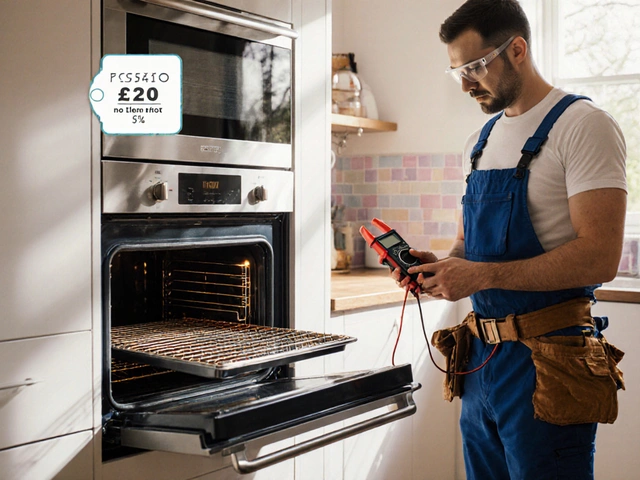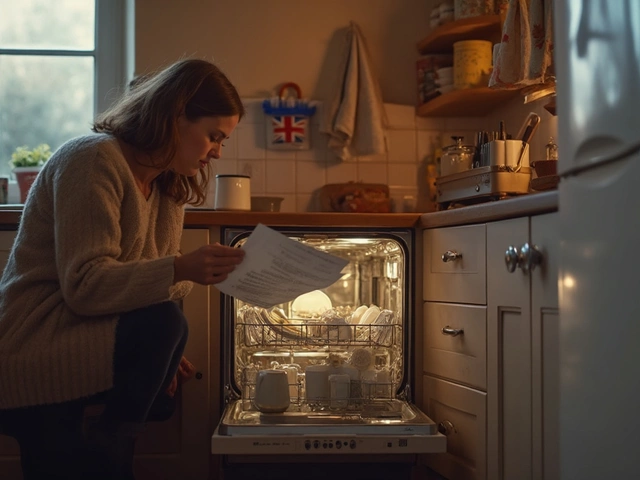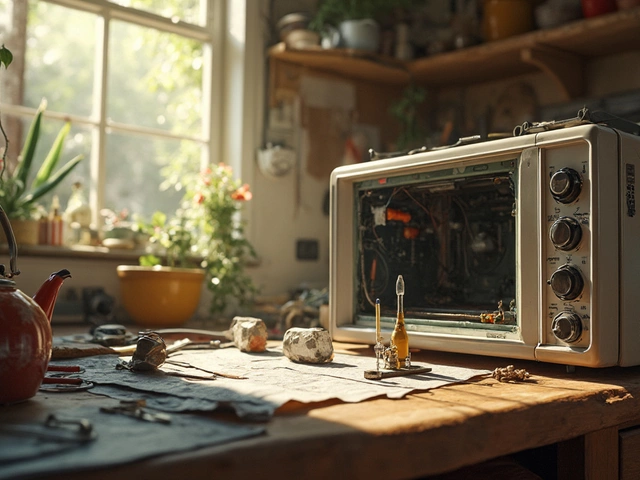Can a Boiler Really Last 50 Years? Lifespan, Tips & Facts Explained
July 11 2025Kitchen Maintenance: Simple Steps to Keep Everything Working
Running a kitchen feels like juggling pans, pots, and gadgets all at once. The good news? A few easy habits can stop small problems from turning into costly repairs. Below are the everyday checks that keep your extractor fan humming, your oven heating right, and your pressure cooker safe.
Extractor Fans – Clean, Test, and Listen
The extractor fan is the unsung hero that pulls steam and smells away. First, wipe the visible grill every month with warm, soapy water. Next, pull out the filter (if you have one) and soak it for at least ten minutes – that removes grease that can choke the motor. After cleaning, turn the fan on and listen. A whirring sound that’s louder than usual often means the motor bearings need a quick oil drop or the fan blades are caught in debris. If the fan still sputters or won’t turn, it’s time to call a pro before the motor burns out.
Remember to check the vent outside your home. A blocked or clogged vent can force the fan to work harder, reducing its lifespan. A quick visual inspection each season is all it takes.
Oven Care – Spot Trouble Early
Ovens get the most heat, so they wear out faster than other appliances. Keep the interior clean – spilled food left to bake can harden into a crust that affects temperature distribution. When you notice uneven baking or a longer pre‑heat time, open the oven and look for a cracked heating element or burnt marks. A quick test: turn the oven on low and see if the element glows evenly. If you spot dark spots or the element stays cold, a replacement is cheaper than a full oven overhaul.
Check the door seal too. A worn gasket lets heat escape, hiking up your energy bill and putting extra strain on the heating element. A simple cloth wipe each month and a visual check for cracks will tell you when it’s time for a new gasket.
Pressure Cookers – Safety First
Pressure cookers are great for fast meals, but they need regular care. After each use, clean the sealing ring with warm water and a little dish soap. Inspect the ring for cracks or hardening; a damaged ring can cause dangerous pressure leaks.
Also, empty the pressure release valve of any food bits. A blocked valve stops pressure from escaping, which can trigger the safety lock. If the safety valve won’t pop, stop using the cooker until a professional checks the gasket and valve mechanism.
Water Heater – Flush or Drain?
Water heaters collect sediment over time, which lowers efficiency and can cause noisy rattling. The easiest method is to flush the tank once a year: attach a garden hose to the drain valve, open the valve, and let water run until it’s clear. If sediment is thick, a full drain and refill works better – just shut off power or gas, let the tank cool, then open the drain fully.
While you’re at it, check the anode rod (usually a metal stick inside the tank). If it’s corroded, replace it; a fresh rod can add years to the heater’s life.
By sticking to these quick checks – cleaning fan filters, watching oven heat, inspecting pressure cooker seals, and flushing the water heater – you’ll avoid most emergency calls. A little time each month saves you a lot of hassle and money down the road. Got a specific problem? Our detailed guides walk you through each fix step‑by‑step, so you can decide whether to DIY or call a certified engineer. Keep your kitchen humming, and enjoy cooking without worrying about breakdowns.
 20 Jun
20 Jun
Dishwasher Repair or Replacement: How to Know What Your Kitchen Really Needs
Stuck between fixing or ditching your worn-out dishwasher? This article breaks down telltale signs that point to either repair or replacement, saving you money and stress. Get practical advice for spotting major issues, plus learn how age and performance play into your decision. Discover smart troubleshooting steps before calling in the pros. Keep your kitchen running smoothly with the right call for your dishwasher.
Read More... 4 Apr
4 Apr
Is It Worth Repairing a Cooker? Uncovering the Real Deal
Deciding whether to repair or replace a faulty cooker can be a tricky call. This article explores the factors to consider in making this decision, such as the age of the appliance, repair costs, and efficiency improvements. Learn about the signs your cooker needs attention and tips for cost-effective repairs. Delve into the particulars and ponder if hiring a professional technician or DIY fix is the better route. This guide will help you evaluate the best course of action to keep your kitchen running smoothly.
Read More... 21 Mar
21 Mar
Is It Worth Fixing Your 15-Year-Old Stove?
Deciding whether to fix a 15-year-old stove can be tricky. This article explores the factors you need to weigh, from cost-effectiveness to environmental impacts. Learn practical tips on diagnosing stove issues and estimating repair costs. Discover when it's wise to repair or replace your appliance. Make smart choices about maintaining your kitchen gear.
Read More... 22 Nov
22 Nov
Troubleshooting Your Electric Hob: Common Fixes
When your electric hob suddenly stops working, it can throw a wrench in your cooking plans. Don't panic, as there are several simple steps you can take to diagnose and possibly fix the issue yourself. From checking the power supply to examining the heating elements, understanding the common problems can save you a call to the repair service. This guide will walk you through troubleshooting methods and offer tips for maintaining your hob in good condition.
Read More...



